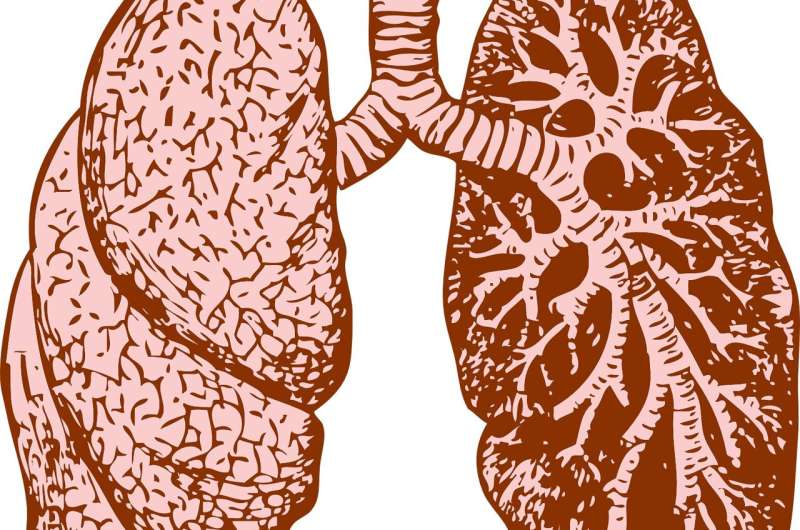This article has been reviewed according to Science X's editorial process and policies. Editors have highlighted the following attributes while ensuring the content's credibility:
fact-checked
proofread
Antibody–drug conjugate I-DXd shows meaningful response in patients with extensive-stage small cell lung cancer

The antibody–drug conjugate ifinatamab deruxtecan (I-DXd) has shown clinically meaningful responses in pretreated patients with extensive-stage small cell lung cancer (ES-SCLC), according to an interim analysis of the Phase 2 IDeate-Lung01 study. The data was presented today at the International Association for the Study of Lung Cancer (IASLC) 2024 World Conference on Lung Cancer.
Patients with ES-SCLC face poor outcomes and have limited treatment options. B7 homolog 3 (B7-H3 [CD276]) is part of the B7 family, which includes immune checkpoint proteins such as PD-L1. B7-H3 is highly expressed in many solid tumors but is absent or expressed at low levels in normal tissues. High and consistent expression of B7-H3 has been shown across all molecular subtypes of SCLC and has been linked to poor prognosis.
I-DXd, a B7-H3–directed antibody–drug conjugate, demonstrated promising efficacy in the ongoing Phase 1/2 IDeate-Pantumor01 study, with a confirmed objective response rate (ORR) of 52.4% and a median duration of response (DOR) of 5.9 months in the SCLC cohort (n=22).
In the dose optimization part of the ongoing Phase 2 IDeate-Lung01 study, two doses of I-DXd (8 mg/kg and 12 mg/kg IV every 3 weeks) were evaluated in patients with ES-SCLC who had received at least one prior line of platinum-based chemotherapy and no more than three prior lines of systemic treatment. Patients with asymptomatic brain metastases could participate in the study. The primary endpoint was ORR by blinded independent central review, with secondary endpoints including DOR, progression-free survival, overall survival, disease control rate, time to response (TTR), and overall safety profile.
As of April 25 2024, 88 patients had received at least one dose of I-DXd; 46 patients received I-DXd 8 mg/kg and 42 patients I-DXd 12 mg/kg, with a median follow-up of 14.6 and 15.3 months, respectively. I-DXd demonstrated promising efficacy, with a confirmed ORR of 54.8% in the 12-mg/kg cohort and of 26.1% in the 8-mg/kg cohort. A rapid response (TTR: 1.4 months) was observed at both doses, while median DOR was 7.9 months in the 8-mg/kg cohort and 4.2 months in the 12-mg/kg cohort.
In a subgroup analysis of 16 patients with brain target lesions at baseline, the intracranial response was 66.7% among 6 patients who received I-DXd 8 mg/kg, and 50.0% among 10 patients treated with I DXd 12 mg/kg. During the study, a higher frequency of treatment-emergent adverse events was reported in the 12-mg/kg cohort than in the 8 mg/kg cohort; the most common TEAEs were gastrointestinal or hematologic in nature, or fatigue. The incidence of adjudicated interstitial lung disease was similar between cohorts, consistent with previous reports.
"I-DXd at both doses showed clinically meaningful efficacy in heavily pretreated patients with ES-SCLC, with the 12-mg/kg dose demonstrating approximately twice the confirmed ORR of the 8-mg/kg dose," according to Dr. C.M. Rudin of Memorial Sloan Kettering Cancer Center in New York City. Dr. Rudin added that the safety profile was generally consistent across the two doses and while no new safety signals were observed, TEAEs were more frequent at the higher dose.
Based on these findings, the 12-mg/kg dose has been selected as the optimal dose for monotherapy in SCLC and will be further studied in the extension part of IDeate-Lung01 and in the Phase 3 IDeate-Lung02 study.
















